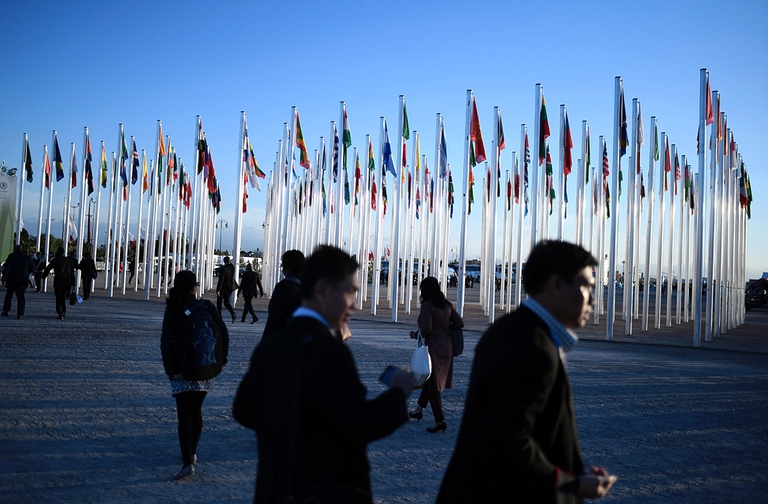
The 26th edition of the United Nations Climate Change Conference, COP26, will be held in Glasgow, Scotland in November 2020. The pre-COP will take place in Milan, Italy.
L’economista Nicholas Stern è a Marrakech per partecipare ai lavori della conferenza sul clima (Cop 22). Il suo messaggio è chiaro: “I danni economici sono maggiori delle previsioni”.
Just a few weeks after the 2015 Paris climate conference (COP21), Lord Nicholas Stern told LifeGate that the agreement, which has indeed been reached, could be not enough to keep the global temperature rise below 2 degrees. “It’s good that we’ll have an agreement, but we still have work to do. After Paris, we must accelerate actions,” Stern said.
Today, in occasion of the ongoing climate change conference in Marrakech (COP22), Morocco, Stern has added an important detail to his concerns about climate change. He said he “underplayed the dangers”. He refers to the well-known Stern Review published in 2006, which became the manifesto on the economic damage of climate change calculated on the basis of a potential international stalemate in combatting climate change.
In the margins of a meeting organised by the London School of Economics (LSE), Stern – who now chairs the Grantham Research Institute on Climate Change and the Environment – has pointed out why we’re not doing enough.
The data contained in your report were already appalling 10 years ago. Why are you saying that they’ve been underestimated?
I think looking back 10 years after the Stern review was published and looking at the increase in emissions we’ve had from around 40 billion tonnes a year then to about 50 now, the problems have become more severe because that means that concentrations have gone on rising at a faster rate. So we are at a more difficult starting point now than we were 10 years ago. And at the same time science has shown us that some of the effects are coming sooner and quicker than we thought and more worrying than we thought. I think that when I said that the cost of inaction was large and bigger than the cost of action I’ve probably underestimated it. The cost of inaction, the cost of delay and the cost of not doing very much is still higher than I thought then. And we’re seeing so much technical progress that the cost of action has starting to fall. And actually now we even see it in a different way. We see that the alternative story, the low-carbon story is actually the growth story of the future.
During a meeting here at COP22 you said that there’s no need of being afraid of what Donal Trump is going to do once he takes office. You cited the opposite case, Canada, which wasn’t taking part in the climate challenge with Stephen Harpet, but is now leading the way with Justin Trudeau. What should we expect from the next 4 years?
I think we should start by being hopeful. We know that many of the states, and cities and firms of the US are moving strongly in the direction of low carbon, because they recognise that’s where the future is, that’s where the future products and processes will be, and that’s where competitive opportunities will lie. And they see that clearly. Not everybody, but many of them. But they’re growing. And we will have to see how Mr. Trump will make his policies, because he’s raising infrastructure, very understandably – wisely in my view. We must hope that that infrastructure is modern, clean and smart. And that can make a difference. We have to encourage, not criticise.
Siamo anche su WhatsApp. Segui il canale ufficiale LifeGate per restare aggiornata, aggiornato sulle ultime notizie e sulle nostre attività.
![]()
Quest'opera è distribuita con Licenza Creative Commons Attribuzione - Non commerciale - Non opere derivate 4.0 Internazionale.
The 26th edition of the United Nations Climate Change Conference, COP26, will be held in Glasgow, Scotland in November 2020. The pre-COP will take place in Milan, Italy.
Thanks to activists, the voice of the world’s peoples resounded through the COP25 like an alarm bell. Governments didn’t reach the results they demanded, but their cries and messages were stronger than ever, reaching even those who weren’t in Madrid.
Climate change poses a risk for millions. However, women are the most vulnerable to its negative consequences: a few simple considerations by the Italian Climate Network help us perceive the global implications of this.
The COP25 ended two days late and with very few steps ahead made. Climate negotiations in 2020 will be an uphill battle as political will clearly seems to be lacking, once again.
The last ten years have been the most “exceptional” and hottest decade ever, with extreme weather hitting people and ecosystems harder and more frequently. 2019 is also on course to becoming the second or third hottest year since records began.
Unite Behind the Science: this was the title of the conference held at the COP25 on 10 December. Greta Thunberg’s presence filled the arena, but this time it was scientists’ turn to speak.
25,000 delegates meet for the COP25 from 2 to 13 December. What can we hope this UN climate change conference, whose venue was changed from Santiago de Chile to Madrid, will achieve?
100 eminent people from all over the world, including Vandana Shiva, Naomi Klein and Noam Chomsky, have signed an open letter after the disappointing results of the COP24. A call-to-arms for climate against world leaders’ indifference.
The outcome of the COP24 in Katowice left many unsatisfied. Greta Thunberg, a young Swedish environmental activist, gave a harsh, heartfelt speech addressing world leaders.









